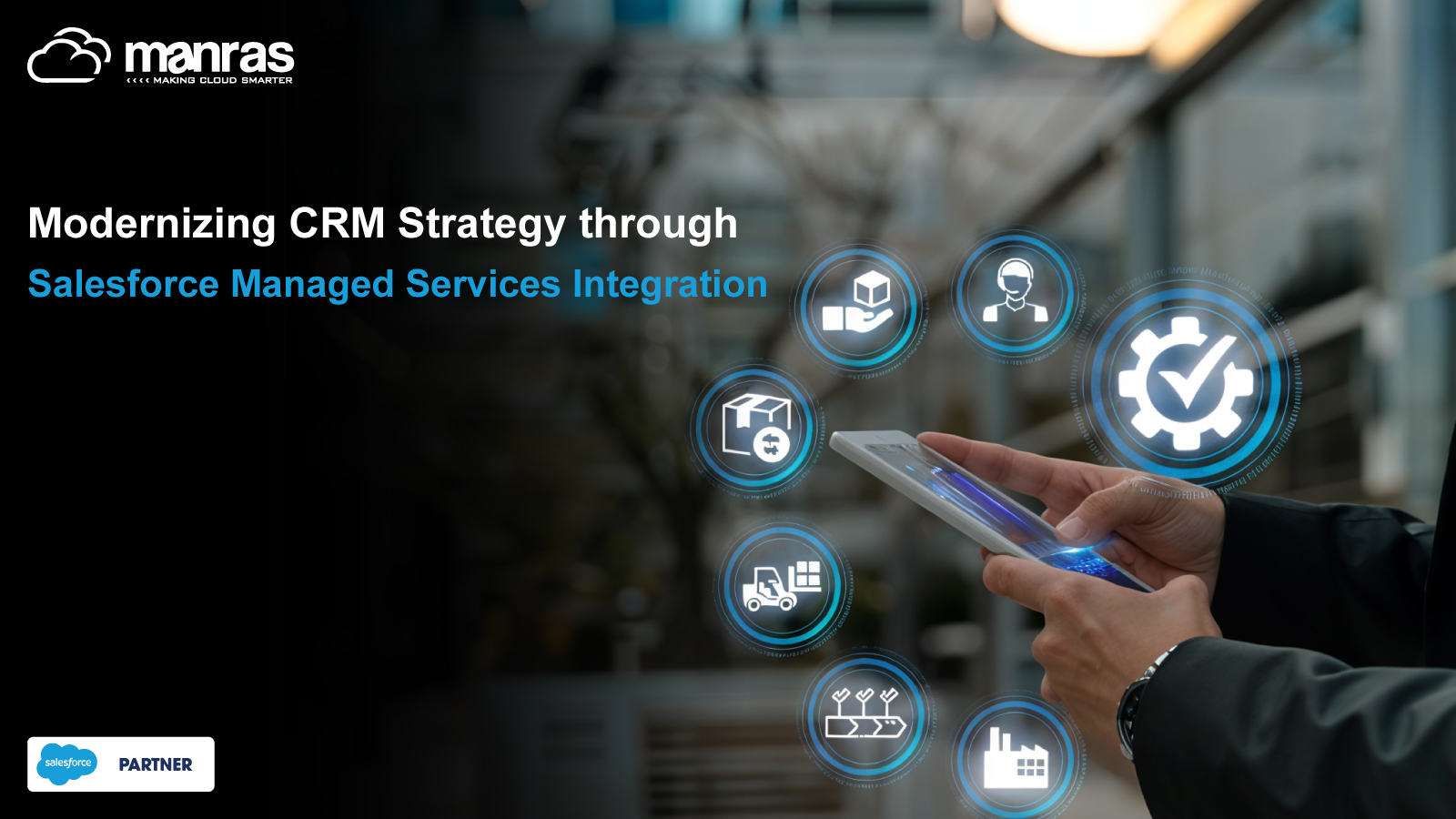
Modernizing CRM Strategy through Salesforce Managed Services Integration
Customer expectations have changed and evolved into fast delivery of information. Modern organizations require more than a basic CRM to stay competitive. They need intelligent systems that can adapt, integrate, and innovate in real-time. That is why Salesforce managed services integration has taken center stage as something that organizations would like to revolutionize the way they communicate with customers, streamline operations, and drive growth.
Salesforce is a very strong CRM system, extremely scalable and flexible. But to truly unlock its potential, businesses must extend beyond short-term implementations and apply a model of continuous improvement. That means not only implementing Salesforce to its optimal capabilities but also ensuring it’s integrated seamlessly with the rest of your tech stack. It involves marketing platforms, ERP systems, customer service applications, analytics engines, and so on.
Integration of Salesforce managed services makes it possible for organizations to do exactly that. It provides experienced care, predictive system optimization, and reliable integration management. All is designed to allow Salesforce to work smarter for your business. It makes CRM a networked, strategic platform that generates real-time insights and action.
Why CRM Modernization Is Critical Today
Customers demand faster responses, more customized experiences, and seamless service across every touchpoint. Legacy CRM-based companies cannot provide this. Such platforms build data silos, slow down decision-making, and limit visibility into the customer journey.
To stay competitive, companies must have a CRM strategy that offers real-time information, system-wide integration, and elastic scalability. Next-generation CRMs must keep up as the business evolves, they cannot remain stagnant or siloed. With alignment of technology to strategy, teams can offer better experiences, drive efficiency, and keep pace with changing market requirements.
Salesforce managed services integration does all this. It keeps the CRM from merely functioning, it gets results that matter across the organization.
Integration is the Heart of CRM Modernization
Modern businesses rely on numerous systems to operate their businesses like sales platforms, ERPs, marketing automation, and customer service software. While the systems are operating in silos, teams spend their time wastefully, duplicating efforts, and going blind on key insights. Integration unites all these platforms, allowing data to flow freely and introducing an end-to-end, real-time view of each customer.
By integrating Salesforce with the overall technology stack, businesses eliminate silos and have clear, actionable data across departments. Teams collaborate more seamlessly, respond faster, and make better decisions.
Specialized teams leverage Salesforce managed services integration to architect, deploy, and maintain these connections with precision. They ensure that every system works together in harmony, stays in sync, and continues delivering value as the business grows.
What Happens When You Get Salesforce Managed Services Integration Right
Salesforce managed services integration enables all this by making sure that your systems play well together, stay up to date, and scale with your business needs. It turns Salesforce into an intelligent and scalable platform to help achieve consistent growth within your organization.
Save 20–40% of Time in Sales Tasks
Teams streamline their work by automating repetitive tasks such as data entry, lead routing, and follow-ups. Instead of switching between stand-alone systems, sales reps work in a single interface that links to all the key tools. This productivity gets rid of delays and allows them to focus on high-value activities like closing deals and relationship-building.
Have Unified, Real-Time Reporting Across Departments
Integrated systems feed accurate, real-time information into Salesforce dashboards. Marketing, sales, and service teams no longer rely on stale spreadsheets or siloed reports. Leadership has one truth: to track performance, discover patterns, and make timely decisions in favor of company goals.
Prevent Missed Leads and Accelerated Support Follow-Ups
Automation and integration ensure that any lead or customer query does not slip through the cracks. Alerts or assignments are automatically generated for new leads, and support tickets synchronize in real-time to service tools. This results in customers receiving faster response times and better service, which translates into higher satisfaction and retention.
See Increased User Adoption and More System Usage
When the CRM is simple and aligns with how teams actually work, then people utilize it. Together, intuitive flows eliminate resistance and promote adoption. Training needs diminish as the system will be intuitive, and users will have faith in what they are doing.
Why Modernizing CRM Isn’t Just a Tech Upgrade
Modern CRM systems are no longer simply databases or sales journals. They are the command center of customer interaction, with real-time collaboration, predictive analytics, and smarter business decisions. An actually cutting-edge CRM must stay connected to all corners of the organization, stay attuned to change, and enable constant optimization. It is not just at launch, but forevermore as well.
Salesforce gives you the tools to build this kind of culture. It has automation, AI, advanced analytics, and integration features that let you do complex business processes. But the key difference is how you use these tools. Just plugging into Salesforce is not enough. You need to have a strategy that gets people, processes, and technology aligned into one unified system.
When teams are aligned, data becomes broken. Sales cannot see what marketing is doing. Service teams are siloed. Leaders often lack a complete, real-time view of the customer journey. Without strong integration and governance, even strong platforms like Salesforce can fall short.
Salesforce managed services integration solves the issue by bringing everything together. It is combining systems, workflows, and data into a single well-managed system. Your CRM doesn’t just operate; it gets better. Your platform isn’t software anymore. It’s a strategic engine that empowers your teams, improves your insights, and drives long-term business success.
How Salesforce Managed Services Are Turning Tables in the Modern Industry
Businesses are more adaptable than ever nowadays. Markets shift quickly, customer demands rise, and web-based tools evolve on a regular basis. To keep up, businesses must alter their internal frameworks at a comparable pace. Salesforce, being such a robust CRM solution, gives businesses the flexibility but only if they control and scale it accordingly.
The ones that rely on legacy support models fall behind. They face siloed systems, slow updates, and reactive problem-solving. The ones that switch to a managed Salesforce support services model have speed, agility, and control instead. They roll out new capabilities faster, improve automation, and fix issues before they affect operations.
Sales, marketing, and service teams benefit directly. Behind the scenes is expert management. Teams focus on strategy, not troubleshooting. Data transmits between platforms with no hiccups, workflows align to business outcomes, and decision-makers get real-time insights instantly.
Salesforce managed services integration enables businesses to break down silos, unlock new value, and consistently improve how they work. Along the way, they shift from simply being on Salesforce to leveraging it to its fullest potential. It is turning CRM into a winning differentiator, not just technology.
Why It Is So Important to Utilize Salesforce Managed Services Today
Companies are constantly at odds with going faster, serving better, and learning smarter. Taking months to justify systems or finding ways around integration challenges is not an option anymore. Teams require real-time solutions, bug-free automations, and systems that stay ahead of the company and not despite it.
With increasing customer expectations, organizations need their CRM to constantly deliver value. Low adoption levels, stale refresh, and isolated tools lead to lost opportunity and frustration.
Relying solely on internal teams is going to put everything on hold, especially where there are low or lacking skills.
Active businesses hold the competitive edge. They’re currently on platform capabilities, respond quickly to change, and knock down barriers before they become barriers. With leadership know-how, they simplify processes, consolidate platforms, and enable users to do more without introducing friction.
Managed Salesforce support services deliver business the ability to keep pace with change, unlock system potential, and achieve sustained growth, when it is needed most.
Final Take: CRM Strategy Is a Living System
One-time setups don’t sow the seeds of CRM success. Business needs to evolve. Customer behaviors change. New technologies emerge. A fixed CRM falls behind and behind comes the company using it.
The ones who treat their CRM as a living, breathing entity are the ones who lead the way. They refine processes, innovate fast, and squeeze more value over time. Through embracing proactive support and frictionless integration across systems, they make CRM an actual growth driver.
Salesforce managed services integration keeps businesses on this path. It keeps platforms aligned, data unified, and users in command every day.
Connect to the best Salesforce managed services partner to get the system integrated for your company and touch the limitless heights of success!
For more insights, updates, and expert tips, follow us on LinkedIn.



